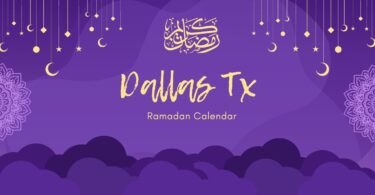In Dallas, as the Ramadan moon peeks, the city buzzes with a unique blend of anticipation and serenity.
This guide isn’t just about pinpointing the start of this sacred month or following a strict timetable; it’s your cozy nook for nurturing mental well-being amidst the fast-paced life.
With Ramadan Kareem starting on March 10th, 2024 in Dallas (fasting timetable below), we’re here to make your Ramadan journey fulfilling and peaceful.
Ready to explore how this special time can soothe and inspire?
Let’s read on.
The Spiritual Essence of Ramadan
The essence of Ramadan is woven from the threads of self-discipline, self-reflection, and an intensified closeness to God. These spiritual practices are not just rituals; they are transformative experiences that touch every aspect of a believer’s life, including their mental well-being.
During Ramadan, the fast extends beyond the abstention from food and drink; it’s a time when individuals are encouraged to reflect inwardly, to quiet the noise of everyday life, and to focus on the purity of thought and action.
This heightened state of mindfulness fosters a sense of peace and mental clarity, offering a respite from the relentless pace of modern life.
Understanding the Mental Health Benefits of Fasting
The practice of fasting during Ramadan is often viewed through a spiritual lens, but its impact on mental health is equally profound. Scientific and psychological studies have started to shed light on how fasting can lead to improved mental clarity and emotional stability.
The act of fasting is not merely a physical discipline; it’s a holistic practice that encompasses the mind, body, and soul.
Fasting initiates a process of detoxification, a cleansing not just of the body but of the mind as well. It’s a time when the chatter of the mind is quieted, making room for deeper reflection and connection. This mental detoxification can lead to heightened awareness, reduced stress, and a greater sense of calm and emotional control.
Integrating the Dallas Ramadan Timetable with Mental Health Practices
In Dallas, the Ramadan timetable is not just a schedule of eating and prayer times; it’s a framework for a holistic lifestyle during this holy month. The timetable for 2024, meticulously calculated, serves as a guide for personal and spiritual activities, including times for meditation and reflection.
Here’s the Dallas Ramadan Timetable for 2024:
FIQA JAFRIA:: SUHOOR: -10 MINS | IFTAR: +10 MINS | Download PDF| Date | Ramadan Date | Day | Sehar | Iftar |
|---|---|---|---|---|
| 10-Mar | 1 | Sunday | 6:35 AM | 7:32 PM |
| 11-Mar | 2 | Monday | 6:34 AM | 7:33 PM |
| 12-Mar | 3 | Tuesday | 6:33 AM | 7:34 PM |
| 13-Mar | 4 | Wednesday | 6:31 AM | 7:35 PM |
| 14-Mar | 5 | Thursday | 6:30 AM | 7:35 PM |
| 15-Mar | 6 | Friday | 6:29 AM | 7:36 PM |
| 16-Mar | 7 | Saturday | 6:27 AM | 7:37 PM |
| 17-Mar | 8 | Sunday | 6:26 AM | 7:38 PM |
| 18-Mar | 9 | Monday | 6:25 AM | 7:38 PM |
| 19-Mar | 10 | Tuesday | 6:23 AM | 7:39 PM |
| 20-Mar | 11 | Wednesday | 6:22 AM | 7:40 PM |
| 21-Mar | 12 | Thursday | 6:21 AM | 7:40 PM |
| 22-Mar | 13 | Friday | 6:19 AM | 7:41 PM |
| 23-Mar | 14 | Saturday | 6:18 AM | 7:42 PM |
| 24-Mar | 15 | Sunday | 6:16 AM | 7:43 PM |
| 25-Mar | 16 | Monday | 6:15 AM | 7:43 PM |
| 26-Mar | 17 | Tuesday | 6:14 AM | 7:44 PM |
| 27-Mar | 18 | Wednesday | 6:12 AM | 7:45 PM |
| 28-Mar | 19 | Thursday | 6:11 AM | 7:46 PM |
| 29-Mar | 20 | Friday | 6:09 AM | 7:46 PM |
| 30-Mar | 21 | Saturday | 6:08 AM | 7:47 PM |
| 31-Mar | 22 | Sunday | 6:06 AM | 7:48 PM |
| 1-Apr | 23 | Monday | 6:05 AM | 7:48 PM |
| 2-Apr | 24 | Tuesday | 6:04 AM | 7:49 PM |
| 3-Apr | 25 | Wednesday | 6:02 AM | 7:50 PM |
| 4-Apr | 26 | Thursday | 6:01 AM | 7:51 PM |
| 5-Apr | 27 | Friday | 5:59 AM | 7:51 PM |
| 6-Apr | 28 | Saturday | 5:58 AM | 7:52 PM |
| 7-Apr | 29 | Sunday | 5:57 AM | 7:53 PM |
| 8-Apr | 30 | Monday | 5:55 AM | 7:53 PM |
The pre-Suhoor hours, when the world is still, offer a serene time for meditation and introspection. Post-Iftar, as the day’s fast ends, is a time for gratitude and reflection. These moments, carved out of the day according to the Ramadan timetable, provide structured opportunities for mental rest and rejuvenation, aligning spiritual practice with mental health needs.
Mindful Eating for Mental Clarity
The meals of Suhoor and Iftar are not just about nourishment; they are about mindfulness and intention. Eating with mindfulness during these times can significantly enhance mental clarity and mood stabilization.
Nutritious Suhoor meals, carefully planned, can provide sustained energy and cognitive function throughout the day. Similarly, balanced Iftar meals help in replenishing energy and ensuring emotional well-being.
Hydration, a key aspect often overlooked during fasting, is crucial for maintaining mental health. Proper hydration supports cognitive functions and mood, making it an essential element of the fasting practice.
The act of drinking water, done with intention and gratitude during non-fasting hours, also becomes a mindful practice contributing to mental and emotional balance.
The Power of Community Support
In Dallas, the spirit of Ramadan is magnified by the power of community. The communal Iftar gatherings and Taraweeh prayers are not just traditions; they are vital support systems that foster a sense of belonging and collective spiritual upliftment.
These gatherings are a reminder that no one is alone in their journey through this holy month. The communal prayers in the masjids, the shared meals, and the collective recitations are profound experiences that strengthen community bonds and provide emotional support.
Local resources and support groups play a pivotal role during Ramadan, especially for those who may find this period challenging.
Dallas is home to numerous Islamic centers and organizations that offer support, counseling, and community events, ensuring that help and companionship are always within reach. These resources are invaluable, offering a safety net of community support that can make all the difference.
Balancing Worship and Rest
The balance between worship and rest is a delicate one, especially during Ramadan. The long hours of fasting, combined with the additional prayers and spiritual duties, can be physically demanding.
Recognizing the importance of adequate sleep and rest is crucial for maintaining mental well-being during this month. Sleep is not just a physical necessity; it’s a spiritual one, allowing the body and mind to rejuvenate and absorb the spiritual gains of the day.
Managing sleep schedules and incorporating napping effectively can significantly improve mental alertness and emotional stability.
Tips like having right foods before fasting, avoiding heavy meals close to bedtime, creating a restful environment, and setting consistent sleep routines can help in maximizing rest during the shorter nights of Ramadan. Napping, especially during the afternoon, can also provide a much-needed boost in energy and mood.
Coping Strategies for Common Mental Health Challenges
Ramadan is a time of joy and spiritual growth, but it can also bring its own set of challenges. Feelings of anxiety, loneliness, or being overwhelmed are not uncommon. Acknowledging these feelings and addressing them is key to maintaining mental well-being during this month.
Coping strategies such as staying connected with loved ones, setting realistic goals for fasting and worship, and taking time for self-care can be incredibly effective.
It’s also important to recognize when professional help might be needed. If feelings of anxiety or depression persist, reaching out to mental health professionals or support groups in Dallas can provide the additional support needed.
Remember, seeking help is a sign of strength, and it’s a step towards ensuring a balanced and fulfilling Ramadan experience.
Additional Resources
In Dallas, a wide array of resources is available to support mental well-being during Ramadan. These resources ensure that individuals have access to the help and guidance they need, fostering a supportive and nurturing environment throughout this holy month.
Local Dallas Mental Health Resources and Helplines
- Dallas Behavioral Healthcare Hospital: Offers comprehensive mental health services and has a helpline for immediate assistance.
- Metrocare Services: The largest provider of mental health services in Dallas County, offering a range of services including counseling and support groups.
- North Texas Behavioral Health Authority (NTBHA): Provides a 24/7 crisis helpline for individuals experiencing a mental health crisis.
Community Centers
- Islamic Association of North Texas (IANT): Offers various community services, including counseling and support groups, especially during Ramadan.
- Dallas Central Mosque: Known for its strong community support programs and services during Ramadan.
- List of Prominent Islamic Centers in Dallas: https://ramadantips.com/dallas/islamic-centers/
Online Platforms and Apps
1. Muslim Pro: Offers features like Quran recitations, prayer times, and a community forum.
2. Headspace: A widely-used meditation app that offers guided meditations, which can be beneficial for mental well-being during Ramadan.
3. Talkspace: An online therapy service providing access to licensed therapists for mental health support.
These resources, both local and online, provide valuable support and services, ensuring that the journey through Ramadan is not just a spiritual one, but also a journey of mental and emotional well-being. Whether it’s through professional counseling, community support, or personal meditation and reflection, these resources are there to guide and support every step of the way.











